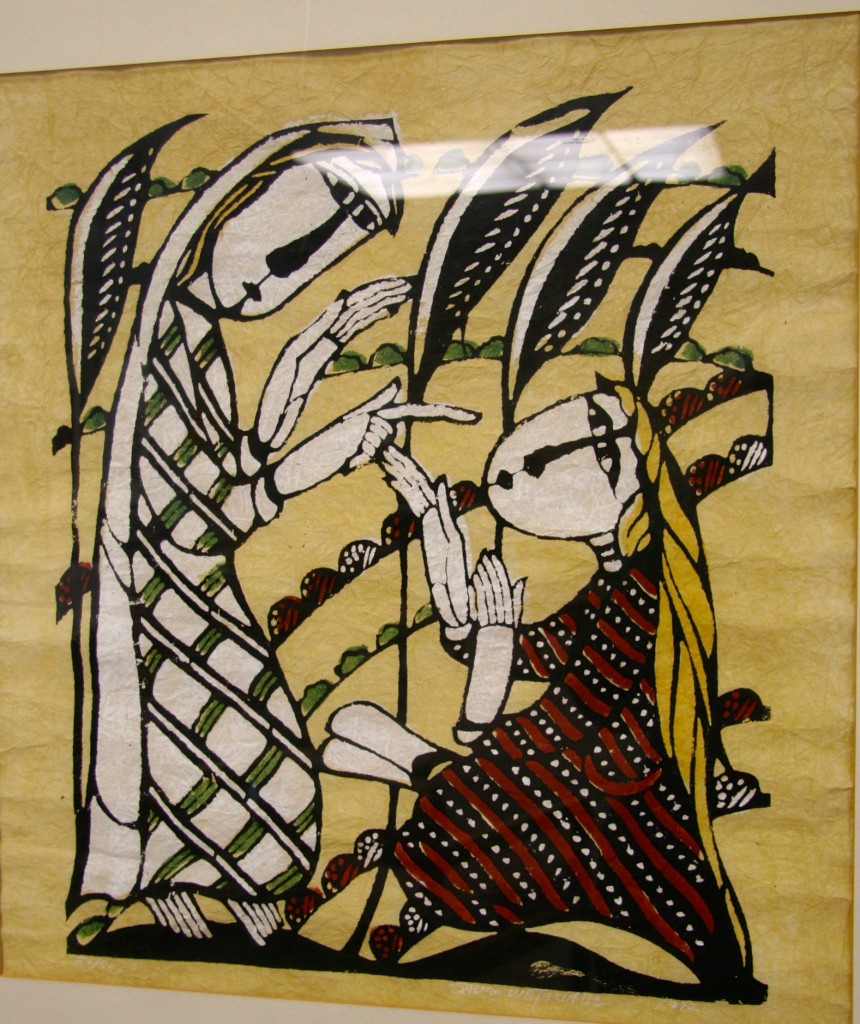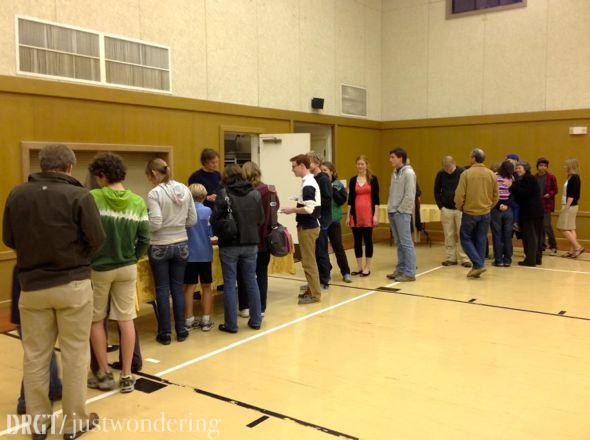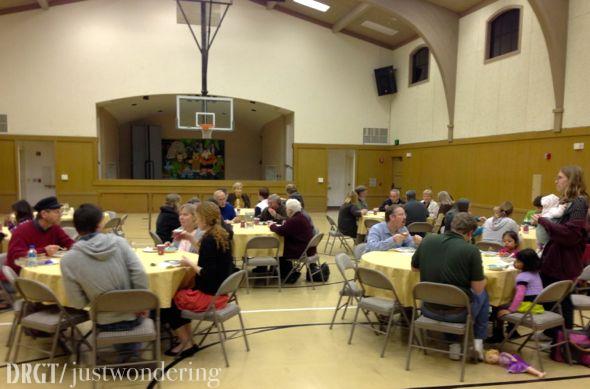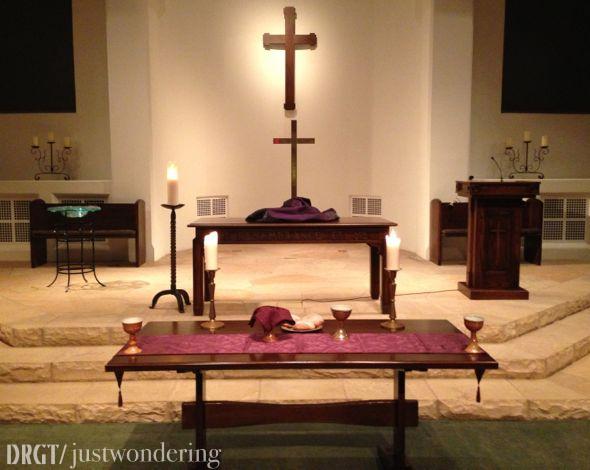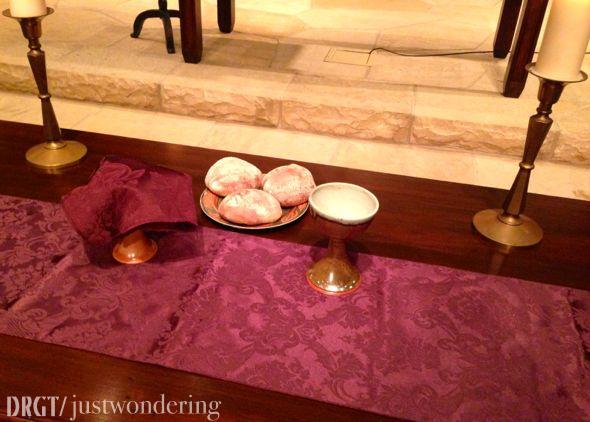I think I have recovered enough decent old sermons to continue this series through the summer. Each week, I’ll also include a photo of one of the stained or painted glass windows in St. Vitus’s Cathedral in the city of Prague. Most of these sermons are dated, a few are not exact, but I can estimate the time frame in which they were originally preached. This one comes from the two-year interim period while we searched for a new Senior Pastor AND engaged in a massive building campaign that had been on the books for almost a dozen years. Our worship center (we met in a gym for over ten years) and office complex had to be completed by a certain date or we faced the re-submission and approval process which in Santa Barbara can take years. It was a season of flux and transition. It was also a season of remembering who we were as the people of God in this place.
Made to Matter: People Who Partnered with God Sermon Series
Mary & Martha: With Our Whole Selves
Luke 10 & John 11 & 12
October 5, 2003
Montecito Covenant Church
Let’s see. . . since we began our fall preaching series on September 7th – that wonderful morning when we broke ground for the project that is now unfolding all around us – we’ve spent our sermon time each week looking at such great biblical characters as Barnabas and Paul, the apostle Peter, those 3 boys in the furnace described in the book of Daniel, and last week, another trio from the Old Testament, Moses and Aaron and Hur.
In fact, we’ve discovered a whole bunch of fascinating and encouraging guys to learn from over the past four weeks. And we’ve learned some good and helpful things as we continue to discover what it means to follow God into unknown territory during this time of transition and change here at Montecito Covenant Church. But today, in just a tiny change of direction, I think maybe it’s time we looked at a couple of the women in scripture who partnered with God. Seems truly appropriate to do so today, in good keeping with the theme of the morning, which has something to do with finding and maintaining good balance in our lives.
Greg has read for you a brief section of scripture from the gospel of Luke – the first story in the New Testament about a couple of sisters who were very important in the life and ministry of Jesus when he walked this earth. Their names are Martha and Mary, and I believe these two women from a long time ago can help us wrestle with one of the most important truths we’ll ever need to learn as followers of Jesus Christ.
And that truth is this: when we choose to enter into relationship with the Great God of the Universe by means of the pathway God himself has given us – the pathway that Jesus carved out with sweat and blood and death and resurrection – when we choose that relationship, we are invited, we are taught, we are requested, we are urged to choose it with our whole selves – with all of who we are.
And in the process of living out that whole-self relationship, we are reminded by the Word of God, and by the life of Jesus, and by the mistakes and the successes of God’s people as told to us in Holy Scripture – we are reminded that living the Christian life with our whole selves is not a particularly easy thing to do.
And why isn’t it easy?
Because we’re a messy, sometimes thoughtless, sometimes frazzled, sometimes thoroughly distracted bunch of people. Because we so often miss the point, get our priorities out of whack, allow ourselves to be hijacked by the culture in which we live, a culture that surely doesn’t go out of its way to encourage us to be whole people, living a life that is equally rich in activity and in quietness, in busyness and in stillness, in doing and being or – as Karen reminded us with her two hats earlier this morning – in acting and thinking.
Because sometimes, to be perfectly honest, we simply don’t get it. We don’t see why we need to choose ‘the better way’ as Mary is described as doing in the story before us today. In fact, we’re often not convinced that her way is the better way. Why should we sit on the floor at anyone’s feet when we could be up and moving, bustling about, accomplishing something.
In fact, I’m willing to wager that a goodly number of you – if you were really honest about this – might agree with me that Martha has gotten kind of a bum rap over the years. I mean, be real. Haven’t you always heard this story told in such a way that Martha comes off as the prototypical busybody, A-type personality who’s a little bit dense when it comes to the ‘really important’ thing that Mary has chosen to do?
Sweet, pliant, passive Mary – praised to the skies because she sits on her rear while all the work is being done. Be honest here, hasn’t that thought ever occurred to you when you’ve read or heard this story? Well – here’s my ‘honest’ response to the story before us today – and this ‘honest’ take comes in somewhat equal parts from both my own thinking and wrestling with this story over many years and from some of the scholarly reading and reflecting that I’ve done this past week. Here’s what I think about it all:
Martha is a trooper, in my book.
We’re told that she’s the owner of the home to which Jesus has come for dinner – and that’s a fairly unusual thing in 1st century Palestine – that a woman should be a property owner. That makes her interesting to me right from the get-go. And homeowner Martha has extended her wonderful gifts of hospitality to Jesus and she’s doing her hostess thing – the good thing, the right thing, the expected thing. She’s fixing a meal, she’s setting a table, she’s timing the meat and the side dishes so that nothing’s too hot or too cold when the food is spread. She’s workin’ it – apron around her waist, sweat in her hairline, doing her darnedest to make things nice for the visiting rabbi.
And she’s doing it all by herself.
She doesn’t live here alone, you know. She has a sister – undoubtedly a younger sister – one who seems to have sort of a ‘crush’ on Jesus. There she is, sitting on the floor at his feet – just like she was a real student of his! And Jesus is allowing it, even seems to be enjoying this conversation with a woman, treats her like she might have a brain in her head. But nonetheless, she is just sitting there.
So I’m not at all surprised that our friend Martha begins to mutter under her breath all the while she’s stirring the pots and setting the table. “I do, and do and do for you people, and this is the thanks I get???” And I am intrigued by the fact that she then proceeds to say those mutterings out loud, and directs them to . . .Jesus. Not to her slack-off sister, but to the rabbi himself. She’s no coward, that’s for sure. She seems to feel sure enough about her own relationship with Jesus to speak the truth – to share her feelings and her concerns.
And here’s the kicker for me in this story – Jesus is really so kind to her with his answer. Contrary to many interpretations of this little story, I don’t think Jesus is rapping Martha across the knuckles here. He loves the fact that Martha is doing something nice for him, that she is welcoming him to her home with food and drink and festivity.
We know from so many other small stories in scripture that Jesus himself was a great host – a person who loved to welcome others and to provide for their physical needs. And we also know that Jesus loved a good dinner party – had quite a reputation in some quarters as a bit of a party animal, if the truth be told. So as he responds to Martha’s outburst, he calls her by name – twice. “Martha, Martha. . .” which is a lot like saying, as the New Living Translation puts it, “My dear Martha.”
Martha, my friend, one that I love – these details are killing you! Let them go. Just let them go. I know your meal will be excellent. I thank you for your care for me. But . . . listen to me, my love. All of this hustle and bustle is just wearing you out. There’s more than enough for all of us to eat. Come, sit down for a while. Mary, bless her heart – she’s made a discovery today – a wonderful discovery. She’s found the most nourishing thing to do today and that’s to sit and listen to me, to talk to me, to learn from me, to be with me. Come, my friend. You do the same. We’ll all eat soon enough and we’ll love every bite of your beautiful meal.
That is the spirit of this brief couple of sentences. There is no condemnation in Jesus’ words – there is just a little bit of gentle pushing, a tiny, very careful attempt at re-focusing Martha’s attention on the most important thing about the day – being with her guest.
It is basically a call to Martha to be a whole person, fully engaged with all of who she is in her relationship with Jesus. Her generous service is welcome and gratefully received. But the personal interaction is what is missing. Sweating in the kitchen is leading to Martha’s being burned out and burned up. She’s tired and she’s resentful – a deadly combination when it comes to relationship-building.
But . . . here’s what I don’t want us to miss here: she tells Jesus about it!
She doesn’t just keep on muttering to herself, growing ever angrier and more bitter. No, she unloads it on the Lord. Now it is quite true she doesn’t get quite the response she thinks she wants! She thinks she wants Jesus to make things ‘fair,’ to get Mary off the floor and into the kitchen. But what she truly wants – and Jesus, of course, knows this – what she truly wants and what she truly needs, is to get out of the kitchen and down onto the floor – right there with her sister.
When I am working hard – when I am working too hard, to be more exact – I can so completely understand what Martha is feeling in this story. Especially if I’m working and someone else isn’t. I did this with my kids when they were growing up, I do it with my husband and my friends more often than I like, and I’m increasingly aware that I even do it sometimes when I’m all by myself.
I see something that needs doing – a good thing, a necessary thing, a hospitable thing, a thing that I know God would want me to do. And I. . . bury myself in it.
I don’t look for the simplest way to do the thing, in fact I often get just a little bit hung up on doing it well enough that others will be suitably impressed.
And then, somewhere in the middle of it all, it gets twisted around somehow. And in addition to wanting to impress others, I also want them to know just how hard I am working.
And not only that, I want them to feel badly about how just how hard I am working.
And not only that, but I can very quickly move into a really sad ‘poor pitiful me’ mood and you truly do not want to be around when that happens!
Does this ever happen to you?
Well, let’s both learn a little something from Martha here. The next time we begin this downward spiral that moves from doing something good and worthwhile, to overdoing that something for the wrong reasons, to feeling really sorry for ourselves while we’re overdoing, to blaming others and inviting them into our misery . . . let’s do what Martha did. Let’s take our sad and hurt feelings directly to the one who will listen with compassion. Let’s tell Jesus about it.
And let’s try to quiet ourselves just enough so that we can hear his answer to us, which is very likely to be one like this: ”My dear one. . . chill out. Sit down a minute. Be quiet inside. Let me lead you with love to a better place, a place where all of who you are is invited and involved, a place where you can serve me in healthy, wholehearted ways and a place where you can simply be with me, as the prophet Isaiah said ‘in quietness and in confidence.’
Martha is not the villain of this piece. She is the center of the story and she does learn a powerful lesson – at least we hope she does. This story doesn’t actually tell us if that’s the case. But the apostle John takes up these same characters in chapters 11 and 12 of his gospel – and there we learn that both sisters have learned something from this encounter with Jesus the night he comes to dinner.
Interestingly enough, Luke places his story about Martha and Mary right in the middle of a whole section of his gospel where he is talking about what it means to be a disciple, one who learns, one who follows a master teacher. And these two women are there, without a lot of fanfare, just there – as disciples of Jesus.
John takes this truth even further in his retelling of a couple of very important events that happen just the week before Jesus dies. Martha and Mary have a brother named Lazarus, John tells us. And they are all close friends of Jesus and his inner circle of followers. They live in a little town called Bethany, which is on the way to Jerusalem. Word comes to Jesus and his crew that Lazarus is very, very ill. Several days later, Jesus arrives at Bethany – and he learns that Lazarus has been in the grave for four days. Martha hears that Jesus is near to the house – and in typical Martha fashion, she races out to meet him. And she greets him with a grief-stricken accusation: “If you had been here, our brother would not have died!”
And then she and Jesus engage in a really interesting conversation – a conversation of vital importance to all of the disciples’ growing understanding of who Jesus really is. The result of their dialog is that Martha makes a wonderful proclamation of truth about Jesus: “You are the Messiah,” she says, “the Son of God, the one who has come into the world from God.”
Martha nails it – she preaches it – she runs back to the house to tell her sister that Jesus has come.
And very soon, they both will witness the amazing miracle of their brother being raised from the dead. Martha becomes the one who learns . . .and she also becomes the one who proclaims! Martha is learning to be in relationship with Jesus as a whole person, with her whole self – her serving, action-oriented self and her thinking, learning, reflective self.
And what about Mary?
In the next chapter, Jesus is once again at the home of his friends. And, once again, Martha is serving him dinner. But Mary is not off in the corner sitting on the floor this time. No. Mary is doing something in this story – she is doing something amazing, something surprising – even shocking.
She comes to Jesus at the dinner table, she opens a jar of very expensive perfume. . . and she pours it over his feet. Then she loosens her hair – something seldom done in that time and place – and she wipes the oil off his feet. The whole house fills with the sweetness of the perfume and Jesus commends her for this act of service, this act of love, this act of sacrifice.
For Mary realizes – as no one else seems to – that Jesus will soon be dead. Maybe that’s something she learned while she was sitting at Jesus’ feet that day – who knows? But somehow, in some quiet, open-hearted way, she has discovered the truth at the very heart of Jesus’ ministry on earth: that he came here to die, for our sakes. And Mary acts on that truth. Like her sister, Mary becomes a whole-hearted disciple, one who relates to Jesus with all of who she is – her quiet, reflective self, and her loving, serving, acting self — her whole self.
And if we are to be in relationship with Jesus in this way – as whole persons, fully engaged in both service and silence, in both acting and thinking, in both doing and being – we must make space in our lives for both Martha and Mary. Both gifts are needed, both parts of our selves are invited to the table.
Does the Martha in you tend to crowd out the Mary? Do you too often find yourself buried by work, by good work, by God’s work . . . only to find yourself disconnected from God himself? Then, as we come to this table today, invite Mary to join you. Make a little space inside for listening and learning.
Or does the Mary in you find plenty of room for expression? Are you able to be quiet easily, sometimes too easily? Do you rely on your quiet nature too much sometimes, trusting yourself to be where you think you need to be spiritually rather than trusting God to fill you with power and strength so that you can also do the work to which he has called you? If that is true of you today, then I urge you to create some space for Martha next to you at the table today. Invite the more active part of yourself to fully engage in fruitful, meaningful service in Jesus’ name.
God has called us by name and we are his. All of who we are is his.
Let’s take our whole selves to God in prayer.
Gracious and loving God, father of our Lord Jesus Christ and our Father,
we come to you today acknowledging our need to live fully for you,
to live as whole people in your presence and in this world.
Help us always to choose the most needful thing
of being with you to listen and to learn.
But also help us to use the gifts you’ve given us
to serve you and to serve the world.
We pray this in the name of Jesus,
who modeled for us a life wholly lived,
a life fully lived,
a life lived with passionate action
and with quiet devotion.
Amen.


